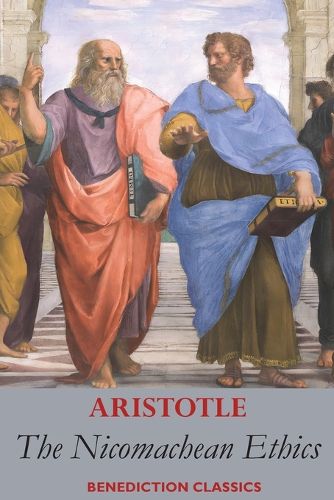Readings Newsletter
Become a Readings Member to make your shopping experience even easier.
Sign in or sign up for free!
You’re not far away from qualifying for FREE standard shipping within Australia
You’ve qualified for FREE standard shipping within Australia
The cart is loading…






This title is printed to order. This book may have been self-published. If so, we cannot guarantee the quality of the content. In the main most books will have gone through the editing process however some may not. We therefore suggest that you be aware of this before ordering this book. If in doubt check either the author or publisher’s details as we are unable to accept any returns unless they are faulty. Please contact us if you have any questions.
"Freedom is obedience to self-formulated rules."- Aristotle, The Nicomachean Ethics.
"Aristotle numbers among the greatest philosophers of all time. Judged solely in terms of his philosophical influence, only Plato is his peer." - Stanford Encyclopedia of Philosophy.
"If Plato's prose was silver, Aristotle's was a flowing river of gold." - Cicero.
Aristotle's The Nicomachean Ethics (sometimes known merely as Ethics) is one of the most influential works on ethics. It addresses the question of how to live well: It argues that the happy life, the flourishing life, is promoted by the pursuit of virtues. These he divides into virtues of the mind (including knowledge, wisdom and insight), which are learned, and virtues of the character (including courage, justice and generosity), which are gained by practice. He explains that practical reasoning and friendship are essential to a flourishing life and that the highest form of friendship is based on the admiration of the virtues of the other. The Nicomachean Ethics, written over two millennia ago, has been a foundation for ethical thought. Thomas Aquinas referred to Aristotle as "The Philosopher" and incorporated his work into the Catholic worldview. More recently, the twentieth-century school of Virtue Ethics is closely allied with Aristotle's thought.
This edition of a classic work of philopophy
contains an introduction, contains extensive explanatory notes, and is set in easy-to-read 11-point font.
Aristotle (384-322 B.C.E.) is among the greatest philosophers of all time. Judged solely in terms of his philosophical influence, only Plato is his peer. His thought was original, profound, systematic and wide-ranging, including ethics, rhetoric, poetics, physics, metaphysics, and biology. It was incorporated into Catholic theology by Thomas Aquinas. It was also the basis of Protestant ethics until well into the seventeenth century. Aristotle's works shaped centuries of philosophy from Late Antiquity through the Renaissance; even today, they continue to be keenly studied and debated.
$9.00 standard shipping within Australia
FREE standard shipping within Australia for orders over $100.00
Express & International shipping calculated at checkout
This title is printed to order. This book may have been self-published. If so, we cannot guarantee the quality of the content. In the main most books will have gone through the editing process however some may not. We therefore suggest that you be aware of this before ordering this book. If in doubt check either the author or publisher’s details as we are unable to accept any returns unless they are faulty. Please contact us if you have any questions.
"Freedom is obedience to self-formulated rules."- Aristotle, The Nicomachean Ethics.
"Aristotle numbers among the greatest philosophers of all time. Judged solely in terms of his philosophical influence, only Plato is his peer." - Stanford Encyclopedia of Philosophy.
"If Plato's prose was silver, Aristotle's was a flowing river of gold." - Cicero.
Aristotle's The Nicomachean Ethics (sometimes known merely as Ethics) is one of the most influential works on ethics. It addresses the question of how to live well: It argues that the happy life, the flourishing life, is promoted by the pursuit of virtues. These he divides into virtues of the mind (including knowledge, wisdom and insight), which are learned, and virtues of the character (including courage, justice and generosity), which are gained by practice. He explains that practical reasoning and friendship are essential to a flourishing life and that the highest form of friendship is based on the admiration of the virtues of the other. The Nicomachean Ethics, written over two millennia ago, has been a foundation for ethical thought. Thomas Aquinas referred to Aristotle as "The Philosopher" and incorporated his work into the Catholic worldview. More recently, the twentieth-century school of Virtue Ethics is closely allied with Aristotle's thought.
This edition of a classic work of philopophy
contains an introduction, contains extensive explanatory notes, and is set in easy-to-read 11-point font.
Aristotle (384-322 B.C.E.) is among the greatest philosophers of all time. Judged solely in terms of his philosophical influence, only Plato is his peer. His thought was original, profound, systematic and wide-ranging, including ethics, rhetoric, poetics, physics, metaphysics, and biology. It was incorporated into Catholic theology by Thomas Aquinas. It was also the basis of Protestant ethics until well into the seventeenth century. Aristotle's works shaped centuries of philosophy from Late Antiquity through the Renaissance; even today, they continue to be keenly studied and debated.